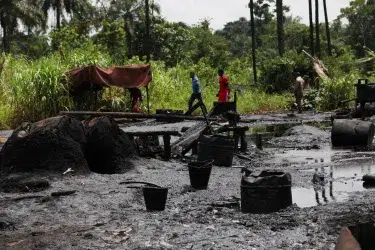In Nigeria’s crude capital, a plan to win the war against oil theft Leave a comment
Port Harcourt, Nigeria – At dawn, the dense creeks and swamps of the Niger Delta are enveloped in an eerie silence, which is interrupted only by the intermittent chirping of Herons, a rare water bird found in this part of Nigeria.
Suddenly, in a flash, the water bubbles and convulses, announcing the galloping approach of speedboats.
The boats usually carry heavily armed militiamen, often clad in work overalls, suggesting they are technicians, said Tonye Francis, who lives in the oil-producing Ogu-Bolo community in Rivers State that’s been in the shadow of an oil conflict for years.
Also in the boats are several dozen empty mini-drums with hoses attached to the bases, that get connected to a nearby oil pipeline after it has been professionally ruptured, the young man told Al Jazeera.
In no time, the mini-drums get filled with crude oil and loaded into barges. The barges, escorted by speedboats, then make their way out of the inlet – crisscrossing other dense creeks and swamps that dot the area – heading in the direction of a waiting foreign vessel, nautical miles away.
“It feels like a movie scene when these activities are going on,” Francis said.
“They [the oil thieves] operate unhindered. Sometimes, those involved are given security cover by their sponsors.”
For years, incidents like this one have become common in Rivers State, which prides itself as Nigeria’s oil capital. But the scene is also a recurring one across the Niger Delta as thieves try to siphon crude from oil pipelines crisscrossing the region.
“We can’t stop them without the support of the military men deployed to the area,” Francis said.
Nigeria is one of Africa’s leading oil exporters. But the industrial-scale oil theft has posed a major threat to communities and the wider economy. Oil theft costs Nigeria millions of dollars each month; about $23bn in oil revenue was lost in 2022 – one of the highest in recent years.
This forced Nigeria to slip as the continent’s largest exporter, according to figures from the Organisation of the Petroleum Exporting Countries (OPEC).
But it appears to be bouncing back and authorities hope improved security measures to help tackle criminals will let them win the war against oil theft for good.
‘Oil theft is a big problem’
Rivers is one of the six states hosting oil installations in the country.
As part of a plan to boost the region’s oil production, authorities in the state last week unveiled a batch of military-grade gunboats to help crack down on criminality and oil theft.
Speaking to Al Jazeera, State Governor Siminalayi Fubara explained that “oil theft is a big problem that needs all hands on deck to tackle it.”
“These six gunboats donated by my government are meant to support the Nigerian Navy to ensure we drastically reduce the activities of oil thieves,” he said.
The gunboats will enhance waterway patrols and response times, especially near submerged oil export pipelines that are prone to attacks, officials said.
“We have set up local vigilantes to support the protection of oil facilities, acquired gunboats, and [are] protecting the ecosystem of the region,” Fubara added.
Rivers is home to pipelines that transport crude from other states to its Bonny export terminal, accounting for 6.5 percent of Nigeria’s entire revenue.
But for decades, theft has impacted negatively on the overall revenue of a country where about 90 percent of government earnings are generated from oil.
Thousands of oil spill incidents have occurred since oil was discovered in commercial quantities in Nigeria in 1958 – due to the activities of oil thieves. The dip in production often has adverse effects on government revenue.
This has continued to affect the people of the communities in these oil-rich areas. Those who depend on farming and fishing have felt a direct effect on their livelihoods and residents have reported numerous health issues.
To provide alternative opportunities for young people, Rivers State government plans to invest more in health, education and infrastructure in areas at risk of pipeline vandalism.
“We are doing our best to discourage any form of economic sabotage,” Fubara told Al Jazeera, “which is why the country’s output has increased in recent months given our support and protection of pipelines.”
Recent gains can be sustained’
Oil export is Nigeria’s mainstay as crude production and now averages 1.8 million barrels per day compared with 1.3 million (bpd) in March, though the country has the capability to export close to 2 million bpd.
The group chief executive officer of the state-run Nigerian National Petroleum Company, Mele Kyari, has attributed the increased production to improved security measures and the support of joint venture partners.
“We have reached a new peak in production that we haven’t seen in the last three years. This is related to the sustained efforts by the armed forces and other security agencies to protect our critical assets,” Kyari said in Nigeria’s capital, Abuja.
“I call for enhanced and sustained security engagement.”
Industry experts are optimistic the country’s oil output will peak in a few months if the measures in place are sustained.
“There’s every need to ramp up crude oil production above the current success numbers to help Nigeria defend a fast-falling naira and tackle the insufficient forex supply that has hit the exchange market so hard as the ripple-effect is felt on raising the cost of goods and services as citizens battles to curb the hard realities,” economist Steve Nwachukwu of Steward Asset Management told Al Jazeera.
Nigeria has been struggling with soaring inflation and a sharply devalued currency since President Bola Tinubu introduced reforms more than a year ago aimed at reviving the economy.
Recently, labour leaders and civil society led antigovernment demonstrations to voice discontent over government reforms they say have triggered high inflation.
The country’s inflation rate rose to 34.60 percent in November due largely to soaring food prices and an increase in the pump price of petroleum products, according to figures released by the National Bureau of Statistics.
The federal government has maintained that this phase of the economic crisis is temporary and expects the increase in oil production to boost revenue.
“The recent gains can be sustained if deliberate actions are taken to curb oil theft and encourage IOC’s [international oil companies] and others to increase their investment and commitment,” Nwachukwu said.
‘A total reorientation’
For the governor of Rivers State, more effort is needed to discourage oil thieves.
“We are committed to the government’s remediation of the polluted environment. That is why we are increasing support to other economic sectors like agriculture to tackle poverty which is one of the major reasons the people break pipelines to steal oil,” Fubara said.
“What we need is a total reorientation of the people to discourage them from stealing oil. It’s a bad situation because you have children as young as 14 and 15 involved,” he added.
Pollution from the activities of oil thieves continues to endanger the lives of the 30 million residents of the Delta. Between 2011 and 2021, there were 9,870 spill incidents, according to data from the National Oil Spill Detection and Response Agency (NOSDRA).
These spills are mostly caused by oil thieves and most communities can no longer engage in agriculture as their livelihoods have been destroyed.
In the early 2000s, Niger Deltan youths, aggrieved by the economic marginalisation and environmental degradation of the region, banded together into armed groups, destroyed oil pipelines, and abducted oil companies’ employees. These attacks reduced oil production significantly, costing Nigeria a fifth of its production.
A presidential amnesty was granted with unconditional pardons and gave cash payments to rebels who agreed to turn in their arms.
In recent years, armed struggle in the Delta has been assuaged partly because of surveillance deals granted to some former rebel leaders after the amnesty deal.
Nigeria’s oil minister, Heineken Lokpobiri, admitted the war against oil theft was a tough fight, but insisted the country was winning.
“Everybody knows that oil theft is one of the biggest economic problems that we have. And we are battling them,” Lokpobiri told journalists in Abuja.
“We are not where we want to be. But certainly, it’s a tremendous improvement as far as the issue of oil theft is concerned. We will continue to battle until we get to 2 million, 2.5 million barrels,” according to the minister.
In 2022, Nigeria lost its top spot among oil-producing African countries and fell behind Angola, Algeria, and Libya. But it bounced back this year, retaining its spot as the continent’s leading exporter, according to OPEC figures released in April.
“[This] will greatly relieve the naira and stabilise the exchange market, which will in turn significantly reduce the cost of goods and services as the high exchange rate is the major contributing factor to high input cost for businesses and manufacturers,” economist Nwachukwu said.
- If you are looking to order local products, handcraft, custom clothes, various books, handmade arts, furniture’s, food spices etc. please, visit our web page at www.ethio-amazon.com. Or send us your request at email contact@ethio-amazon.com you can also contact us on WhatsApp at +2519-44-36-97-53
Additionally, if you would be interested to socialize and looking for a new friend around the world, for future partnership… visit our web page at www.contactyourlifepartner.com
We believed that love can happen anytime, anywhere in a world filled with endless possibilities… for more information contact us at Email contact@ethio-amazon.com or Call us at +2519-44-36-97-53 (WhatsApp),
+ 6676539901 (international)Source (Al jazeeraNews)

